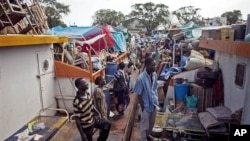The government in Southern Sudan has started to bring southerners back from the Sudanese capital Khartoum. The returnees are arriving in large numbers to Unity State, which borders Northern Sudan.
The families making the two-day trip are dropped off at a place called Naivasha in Bentiu, the capital of Unity State.
Named after the Kenyan town where a 2005 peace accord between north and south ended 22 years of civil war, the lot also is the site of traditional courts, where elders sit under trees and resolve disputes among locals. At one end of Naivasha, crowded under the only patch of available shade, returnees wait to receive ration cards from the World Food Program.
Only people that plan to stay in the state capital, Bentiu, will receive the cards. The others are supposed to be put on buses and sent to the counties of their choice, where there should be ration cards waiting. While they are arriving just as voter registration starts for the January 9 referendum, the people returning to Unity State all said they were coming because they felt unsafe in the north and they were excited to live in an independent south.
"If they are abusing you, why live with those people who are abusing you? It is better to live your own life, it doesn't matter if it is good or bad," said Chuor Fit, who arrived in the state capital Bentiu 14 days ago. He was a construction worker in Khartoum and will stay in Bentiu to look for work. He hasn't been able to get a ration card from the WFP and he says he's fed his ten children for the last two weeks with the $8.00 he received from a relative.
Between October 30 and November 16, about 17,000 southerners have returned to Unity State from Khartoum. The government of semi-autonomous southern Sudan paid to bring southerners back from Khartoum.
On November 2, after the returnees started to come back in large numbers, the government in Unity State sent a letter to international humanitarian organizations, asking for help with food and resettlement supplies. Deputy Governor William Daud says that, by helping people return to the south, they are just responding to the will of the people.
"It's not the government who planned that they need to bring the people back, this is the people themselves, they are deciding to come back," he said.
High-level officials from the major United Nations-affiliated humanitarian organizations traveled together to Unity State last week in response to the letter from the state government. According to Lise Grande, the humanitarian coordinator for the United Nations in south Sudan, the government will have to submit a single plan for how to resettle the returnees before humanitarian organizations can start to help.
That leaves people like Esteban Kuoth, a returnee from Khartoum headed to the state's southernmost county, increasingly frustrated. "I am sick and tired of staying here because I don't have any food, any water or any money," Kuoth said.
Kuoth is staying at a school near the center of Bentiu, sleeping in the classrooms with a couple hundred other returnees waiting for buses to take them home. The government has asked the International Organization of Migrants to pay for the rest of the buses.
Kuoth said they ran out of food that day, after sharing with another group of recent arrivals. Grande from the UN said that WFP is providing emergency food to the people staying at shelters.
The increase in the population of Unity State has made more serious a few of the challenges the state faced before they arrived. According to the U.N., at least 50 percent of the population suffers from at least moderate food insecurity. Most of the people here are cattle herders, and they get their food from the market. William Kuol, head of the state's agency taking in the returnees, says it will be very hard for returnees to take care of themselves before the next harvest in June.
"When they come here, they have no cows, they have no goods, they have no farm. They don't have anything," Kuoth said.
So Kuol and his agency have made a request, separate from the one made by the governor, for a nine month supply of food, medicine and shelter. If there is a war between north and south Sudan sometime around January's referendum, Unity State would be especially hard-hit. It is the south's most oil-rich state and a likely target for the north to attack first. Their main connection to the outside world is a road into Northern Sudan. Most of the goods in the market come from the north. The government has started its returnee program in Unity State, possibly to increase U.N. focus on the area in case the worst happens.
As Southern Sudanese Return Home, Challenges Arise




